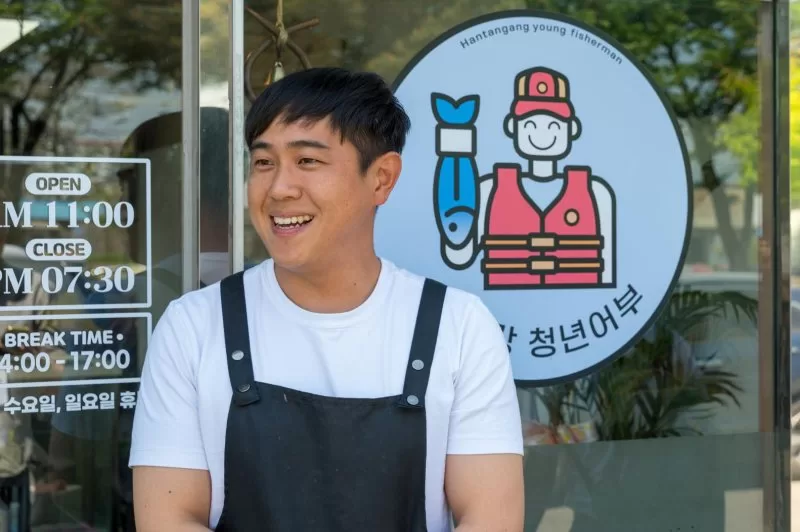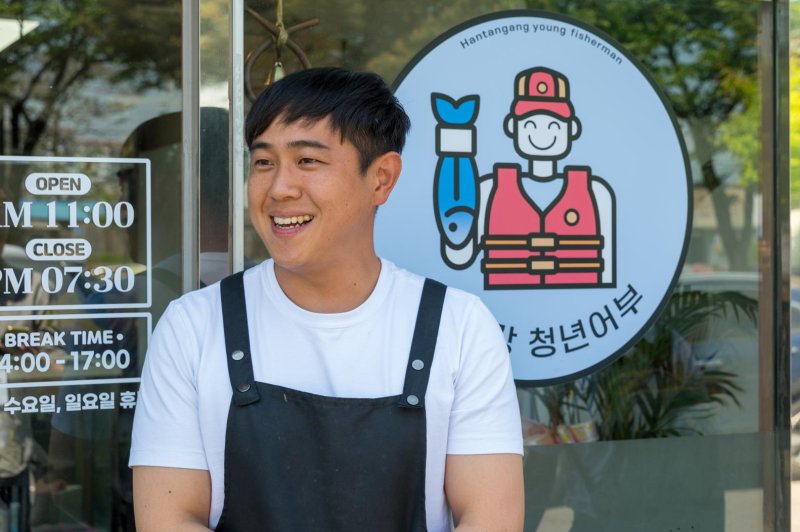1 of 8 | Kim Eun-beom, 35, has started a successfulul fishing and restaurant business along with a high-profile social media channel in rural Yeoncheon County, South Korea. Photo by Thomas Maresca/UPI
YEONCHEON, South Korea, May 17 (UPI) — As millions of commuters in Seoul crowd onto subways or sit in rush hour traffic every morning, Kim Eun-beom heads to a very different workplace just 60 miles away: the Hantang River, where he’ll go fishing to supply his restaurant and food delivery service in Yeoncheon County.
The 35-year-old is a rare breed in South Korea — a millennial who has chosen to stay in his rural hometown rather than relocate to the Seoul metropolitan area, where more than half of the country’s 52 million people live.
South Korea’s urban migration, coupled with one of the world’s most daunting demographic declines, has left Yeoncheon as one of nearly 90 counties and towns officially designated as “depopulation areas” in danger of extinction.
For Kim, however, Yeoncheon — located next to the demilitarized zone that divides the Korean Peninsula — has been a land of opportunity. He has turned his passion for fishing into a successful food business and built a large profile on social media, with more than 145,000 subscribers to his YouTube channel.
“I got into the fishery industry because I just love freshwater fish,” he said. “So I wanted to genuinely introduce these fish to other people, and that was the beginning of my social media presence.”
The channel has become a marketing tool for his restaurant as well as a way for Kim to highlight the advantages of a rural lifestyle in South Korea — such as access to the government’s Local Extinction Reaction Fund, which began in 2021 and will disburse $7.3 billion over 10 years to at-risk areas. Yeoncheon itself offers a range of subsidies from business financing to housing loans to cash gifts for new parents.
“Living in rural areas, you can get a lot of support from the government in terms of starting a project or even engaging in the agricultural and fishery industries,” Kim said. “So I wanted to introduce the subsidies that are here.”
“And I also wanted to show how I enjoy my life in Yeoncheon,” he added.
Kim works long hours, usually starting his mornings at 6 a.m. on the river and working into the evening preparing and delivering food. But he said he is earning significantly more than he did at the office job he held before moving to fishing full-time.
“As an office worker, even though you work really hard you get the same salary as your co-worker,” he said. “However, if I work hard and become more diligent, I earn more.”
New hope for abandoned schools
Like many rural areas, Yeoncheon is seeing a population decline, shrinking from 44,000 five years ago to less than 42,000 today. It is also rapidly aging, with nearly one-third of its population over the age of 65, according to county statistics, leading to numerous school closures due to lack of students.
“In the past, we had 20 elementary schools but now we only have 14,” Misook Yoon, an official with the Yeoncheon Biosphere Reserve, told UPI. “And I believe that in five years, it is going to be half of that.”
The county’s local education office has been working to maintain the schools and is offering them at discounted rates for businesses.
“[Schools are] cheap compared to other spaces,” Yoon said. “If we compare them to other private buildings, the price is about one-twelfth. In other areas, what you pay for one month will get you a space here for one year.”
The opportunity drew Noh Hyun-joo, a veteran film and television set designer, to open the K-Drama Art Exhibition Hall in an empty Yeoncheon elementary school. The space is a hands-on museum of props and period settings taken from actual productions and has become a popular local attraction for school groups and families.
“I was looking for places to host this exhibition hall, and I got to know about this school,” Noh said. “I used to live in Yeoncheon when I was young, so I engaged with the education office and decided to start my business and exhibition here.”
Kim Hyeong-jun is another local who took advantage of a shuttered school, opening a drone training center called Assetta in an abandoned one-story structure three years ago.
The center provides licenses for flying drones, which are used extensively in Yeoncheon by farmers for spraying pesticides.
“On top of that, this is an area next to the DMZ,” Kim said. “So there are a lot of military bases and they also are interested in getting these licenses and certificates.”
Many courses are subsidized by the government and Kim said that training locals, rather than hiring outside contractors to operate drones, creates a “virtuous cycle” of opportunities.
“[Locals] know this region’s geological conditions very well,” he said. “When they get certified, they give back to the society. My goal is to help give opportunities to the young people.”
Other efforts are underway to attract more tourists to the area, which already boasts natural scenery such as Jaeiin Falls and a major prehistoric archeological site that hosts a yearly Paleolithic Festival.
South Korean officials have chosen Yeoncheon as the site of a new DMZ hiking trail, allowing visitors up-close access to the heavily fortified buffer zone that has divided the peninsula since the end of the Korean War in 1953.
Still, rural rejuvenation remains a daunting challenge. The administration of President Yoon Suk Yeol recently announced a new ministry to address low birth rates and has prioritized expanding high-speed rail networks to allow people to live farther outside of Seoul.
For now, boosters such as Kim, the fisherman, continue to spread the word about all that Yeoncheon has to offer in contrast to the daily grind of Seoul.
“Whenever I portray my daily life and share my daily activities, I get a lot of comments from subscribers that say they are envious — especially those who are living in Seoul,” he said. “Not only elderly people, but also the young generations think it looks really peaceful and happy to live here.”

